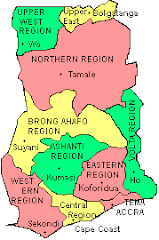I friend that I met the other day in the market named Dolbert, showed me around town. I don't remember how we got to the topic but I asked him to show me where the clinic was as well as the police station. I probably should have looked into finding these places as soon as I arrived but since my health and safety have been fine and it felt like a thousand other things were going on I didn't think of it. A couple days later as I write this, I'm thankful I looked into finding the clinic because I went there yesterday feeling pretty sick. I think it might be something I ate, but I got some medicine so I should be feeling better soon. One thing I realized that I take for granted is my health and availability of medical care. The clinic was good here, I'm not comparing it to Canada, but what I realized is that because I have money, i.e. a privileged westerner, I can buy any medication or medical care I need, in fact, worst comes to worst I have health insurance through EWB that will fly me to the nearest ‘western’ hospital if needed.
Now that's privilege. And for what reason do I have this privilege? What did I do to deserve such luxury? Well, I don’t actually. I won the lottery of birth and was born in Canada into a white middle class family, had I been born here in Paga I may or may not have enough money to afford medical care or might/might not have to sell something or go without something in order to pay for it. I'm just guessing because I don't know the realities people face here, but I know there's plenty of people living hand to mouth, day by day, week by week, month by month. I guess the reason I brought this up is because while I was at the clinic I had a malaria test done, which turned out negative but I was showing all the symptoms. I'm not worried at all because again I'm privileged: I have money. I'm thankful, but not proud of this privilege. About a meter away from me lie a box of pills that will kill the parasite and cure malaria. It's so common for EWB volunteers to get malaria that it's kind of a joke to get it, mind you an uncomfortable, eye-opening, and regrettable one. Maybe joke is not the best choice of words, but it's talked about as not that big of a deal in the grand scheme of things because at the end of the day we can afford the cure.
Now what blows my mind and upsets, discourages, depresses, yet ultimately motivates me into some sort of action are the stats I've read stating that 3,000 people die every day from Malaria (I don't know the accuracy of the stat, and I don't have access to high or med speed internet, but I'm sure anyone can look it up on google). It's just astonishing how so many people, whatever the number, die everyday from a curable and moderately preventable disease. I'm sure bed nets like the one I'm under right now significantly reduce the rates, and they're not very expensive. I remember a while back seeing a bed net campaign from (of all people) Rick Mercer, I think it was promoted like 10$ can save a life, or something along those lines. I didn’t think much of it at the time and I can't remember if I donated or not, but hearing how many people die from malaria, being in a high risk area, and hearing how horrible it feels, brings a little more perspective and reality.
Kind of changing gears, I'm thinking about the approach of encouraging Canadians to buy an inexpensive tangible item like a bed net or a goat or seeds to assist someone who could use a hand. I think it's a great idea and I encourage everyone to chip in if they can. I also think it appeals to most people back home because we can relate to direct cause and effect things like buying something and an immediate result coming from that purchase, no questions asked, simple. Maybe not the case with bed nets but I have read and heard first person accounts of this type of approach being too simple. Like building a well/borehole and assuming people will automatically benefit, while not taking into account a plethora of other variables and factors that could inhibit the potential benefits.
Now contrast this previous example to donating the same amount to a 5 year plan that focuses on attitude and behaviour changes among the field staff at MoFA so they can sustainably improve their assistance/service without direct outside intervention and rural farmers can gain access to opportunities and overcome some of the challenges they face on a regular basis. And this project may or may not succeed, the results will take some time and are not as clean-cut. Now we can up-scale the small individual donation to a large donation from the Gates Foundation, Oxfam, or CIDA (Canadian International Development Agency). This is a fragment of the complexity of development, in my opinion: trying to obtain funding from large donors to fund projects where the people involved are in control over the use and implementation of the project and ultimately are in control over their own development, but without easily measurable, concrete results that look great on an excel spreadsheet or financial report.

Subscribe to:
Post Comments (Atom)





I'm so proud of you Brian. If there were more people in this world like you this world might actually be a good place to live in for everyone. Instead of a select few.
ReplyDelete